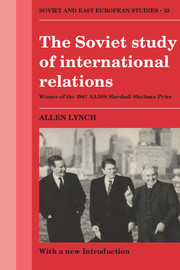Book contents
- Frontmatter
- Contents
- Foreword by Curt Gasteyger
- Acknowledgements
- INTRODUCTION: THE “ NEW POLITICAL THINKING” AND SOVIET FOREIGN POLICY: INTELLECTUAL ORIGINS AND POLITICAL CONSEQUENCES
- INTRODUCTION TO THE FIRST EDITION
- 1 THE BACKGROUND: MARX, LENIN, STALIN AND THE THEORY OF INTERNATIONAL RELATIONS
- 2 THE DEVELOPMENT OF SOVIET POLITICAL STUDIES
- 3 APPROACHES TO INTERNATIONAL RELATIONS
- 4 THE SYSTEMS APPROACH AND INTERNATIONAL RELATIONS
- 5 THE STRUCTURE OF THE INTERNATIONAL SYSTEM: THE SYSTEMS LEVEL
- 6 CRITICAL SUBSYSTEMS
- 7 THE SCIENTIFIC–TECHNICAL REVOLUTION AND THE CHANGING FACE OF INTERNATIONAL RELATIONS
- CONCLUSION
- Notes
- Bibliography
- Index
- SOVIET AND EAST EUROPEAN STUDIES
2 - THE DEVELOPMENT OF SOVIET POLITICAL STUDIES
Published online by Cambridge University Press: 05 August 2011
- Frontmatter
- Contents
- Foreword by Curt Gasteyger
- Acknowledgements
- INTRODUCTION: THE “ NEW POLITICAL THINKING” AND SOVIET FOREIGN POLICY: INTELLECTUAL ORIGINS AND POLITICAL CONSEQUENCES
- INTRODUCTION TO THE FIRST EDITION
- 1 THE BACKGROUND: MARX, LENIN, STALIN AND THE THEORY OF INTERNATIONAL RELATIONS
- 2 THE DEVELOPMENT OF SOVIET POLITICAL STUDIES
- 3 APPROACHES TO INTERNATIONAL RELATIONS
- 4 THE SYSTEMS APPROACH AND INTERNATIONAL RELATIONS
- 5 THE STRUCTURE OF THE INTERNATIONAL SYSTEM: THE SYSTEMS LEVEL
- 6 CRITICAL SUBSYSTEMS
- 7 THE SCIENTIFIC–TECHNICAL REVOLUTION AND THE CHANGING FACE OF INTERNATIONAL RELATIONS
- CONCLUSION
- Notes
- Bibliography
- Index
- SOVIET AND EAST EUROPEAN STUDIES
Summary
… but genuinely profound research presupposes the raising of questions, the answers to which are not known in advance.
Fyodor BurlatskiyVarga's contribution to the development of the social sciences in the Soviet Union goes beyond the challenge he posed to the Stalinist conception of the capitalist world. Varga also challenged the entire Stalinist methodology for analyzing politics and society. In one of his very last works, an introductory piece to “Essays on the Political Economy of Capitalism,” Varga attempts to develop his conception of the methodology proper to the Soviet study of “political economy.” He begins by challenging what he calls “mindless dogmatism,” having obviously in mind the hoary Soviet tradition of justificatory social science, and opposes to it the idea of “a concrete scientific analysis of historical factors …” He sees his subject, political economy, as one without a sharp distinction between the political and the economic spheres. He indicates that he has been concerned with the “new” aspects of the political economy of capitalism and hence presents a “new” analysis of the subject. The time-encrusted dicta of Marx and Lenin are clearly insufficient for this task.
- Type
- Chapter
- Information
- The Soviet Study of International Relations , pp. 26 - 31Publisher: Cambridge University PressPrint publication year: 1987

